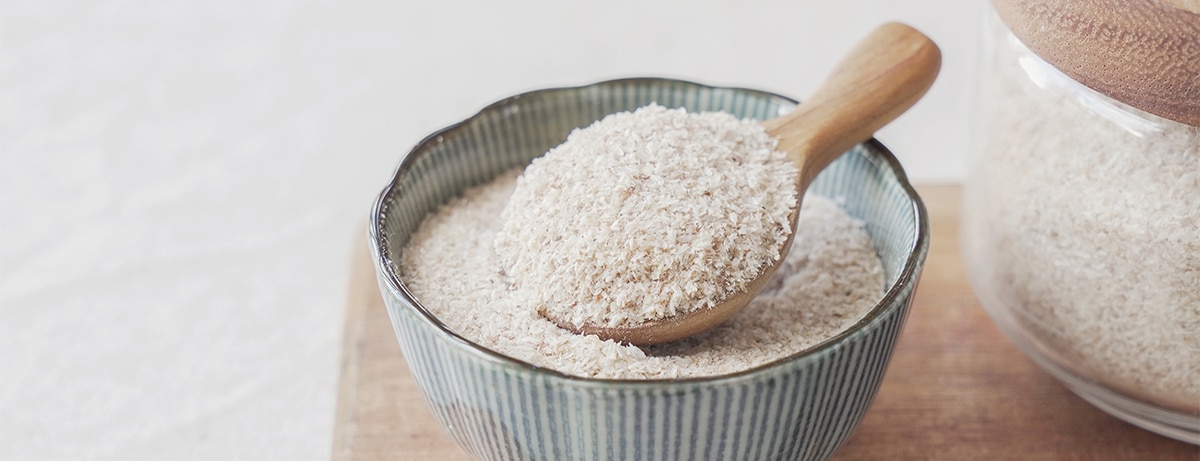10% off £35
What are fibre supplements and what do they do?

Summary
1Types of fibre supplements
Dietary fibre supplements are designed to provide an additional source of fibre to support your daily intake. They come in various convenient forms...
2What do fibre supplements do in the body?
Here’s how different types of fibre work inside the gut: soluble fibre – it absorbs water, forming a gel-like substance that softens stools...
3Possible side-effects of taking fibre supplements
The most common side-effects of taking fibre supplements include: wind, bloating, stomach, cramps, hard and dry stools or constipation...

Types of fibre supplements
- psyllium husks
- linseeds
- inulin
- cellulose
- guar gum
- chitosan
- pectin
Benefits of fibre supplements
What do fibre supplements do in the body?
- soluble fibre – it absorbs water, forming a gel-like substance that softens stools and feeds the friendly bacteria in your gut. Sources include oats, nuts, seeds, fruit and veg, psyllium, and inulin.5,6,7
- insoluble fibre – found in wheat, bran, nuts, cellulose, whole linseeds, chitosan and lignin, provides bulk to help push stools through your digestive system

Dosage
How much is safe to take?
- A history of bowel blockage
- Crohn’s disease
- Problems swallowing or a narrowing of your gullet
- Unexplained changes in your bowel habits for longer than two weeks
- Unexplained bleeding from your back passage
- Problems passing stools despite taking laxatives
Possible side-effects of taking fibre supplements
- wind
- bloating
- stomach cramps
- hard, dry stools or constipation if you don’t drink enough fluids
- an itchy rash
- problems breathing or swallowing
- swelling of the mouth, face, lips, tongue, or throat
The final say
- While they are no replacement for a full and balanced diet, if you struggle to meet the daily recommendation of 30g dietary fibre, supplements might be a good option as a top-up for you.
- Fibre supplements come in many different forms, including powders, capsules, tablets, and gummies. They can be made from several different fibre sources, such as psyllium husks, linseeds or inulin.
- The known benefits of getting enough fibre each day include maintaining a healthy digestive system and keeping you feeling full for longer.
- While fibre supplements are generally regarded as safe to take, it’s always best to speak to a doctor before introducing anything new to your diet, to ensure they won’t interfere with any medications or agitate any pre-existing conditions.
1. https://www.thelancet.com/journals/lancet/article/PIIS0140-6736(18)31809-9/fulltext
2. https://www.nhs.uk/live-well/eat-well/digestive-health/how-to-get-more-fibre-into-your-diet/
3. https://www.ncbi.nlm.nih.gov/pmc/articles/PMC5413815/
4. https://patient.info/digestive-health/constipation/fibre-and-fibre-supplements
5. https://onlinelibrary.wiley.com/doi/pdf/10.1111/nbu.12244
6. https://www.ema.europa.eu/en/medicines/herbal/psyllii-semen
7. https://www.ema.europa.eu/en/medicines/herbal/sennae-folium
8. https://www.ema.europa.eu/en/medicines/herbal/lini-semen
9. https://www.ncbi.nlm.nih.gov/pmc/articles/PMC3342503/
10. https://pubmed.ncbi.nlm.nih.gov/20727237/
11. https://www.nhs.uk/live-well/eat-well/digestive-health/how-to-get-more-fibre-into-your-diet/
12. https://www.betterhealth.vic.gov.au/health/healthyliving/fibre-in-food
13. https://www.stlukes-stl.com/health-content/medicine/33/000958.htm 1
14. https://www.pharmacytimes.com/view/fiber-supplements-health-benefits-and-side-effects














